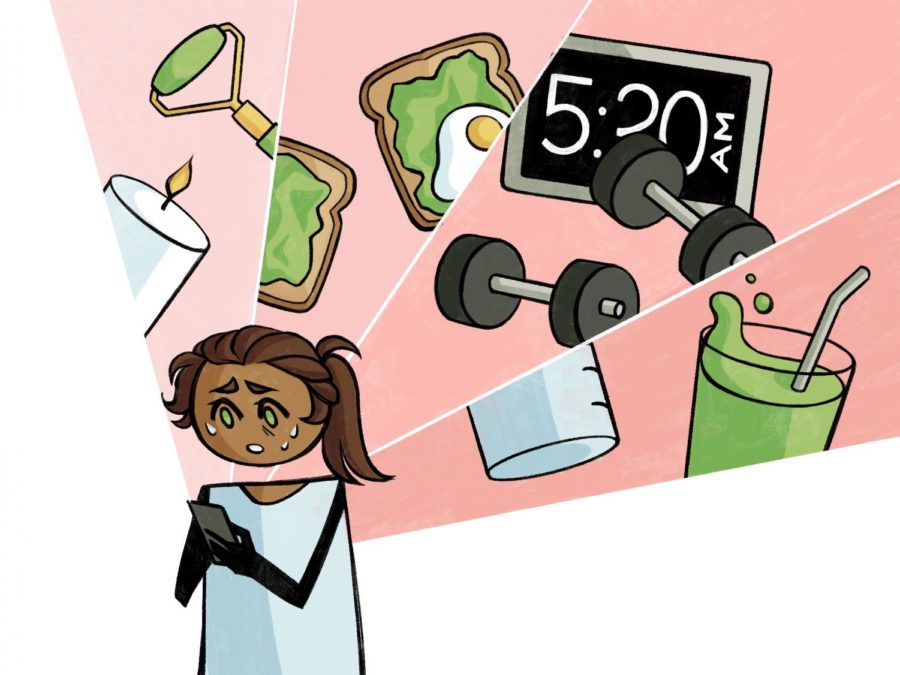An alarm clock rings at 6 a.m. A sliver of light peeks through her white curtains. With a slice of avocado toast and an oat milk latte sitting on her desk, she reaches for her daily affirmations journal. She is ready to take on the day. She is “that girl.”
Raging across social media platforms, the “that girl” lifestyle emphasizes becoming the best version of oneself, aiming to promote a healthier and productive way of living. While being fed by its motivational content may be seemingly harmless, the “that girl” narrative embodies the opposite by perpetuating toxic productivity, enforcing a mold to fit and encouraging poor eating habits.
Toxic productivity is an unhealthy obsession with being productive. Being absorbed in this cycle can cause someone to base their self-worth through their achievements. Simone Milasas, a business coach and author of “Joy of Business,” explains that toxic productivity results in the feeling of failure from not being in a cycle of actively working. Milasas believes that the overwhelming desire for constant productivity limits the fulfillment of any accomplishments.
Partaking in the trendy lifestyle creates the idea of treating life as a never-ending self-improvement project. It traps people into an unhealthy cycle of working relentlessly. On social media, the lifestyle is artificially made to look orderly. People begin to base their self-worth on fitting into the “that girl” mold, and resisting the desire is necessary to stop the persistence of toxic productivity. Living to the fullest potential should be encouraged but not by means of becoming one with the trendy content.
Carefully curated videos represent a perfect lifestyle, yet the perfection that social media portrays is unrealistic. It emphasizes an elaborate skincare routine, pretty-looking “healthy” meals and overall aesthetic. Every aspect of day-to-day life should not be focused on chasing after the false idea of perfection. The widespread influence does not teach others how to craft a routine suitable for their needs. Consuming wellness and fitness content can leave a primarily young audience feeling inadequate. There is no need to become a carbon copy of “that girl” if it leaves a constant internal conflict with maintaining individuality. Self-improvement does not need to be a one-size mold.
Mainly slim, privileged and conventionally attractive white women are shown in the collection of “that girl” content. According to Dr. Jennifer Mills, a registered clinical psychologist and an associate professor of psychology at York University, fitness and wellness content on social media provoke negative thoughts of inadequacy. The demands of fitting into the routine cause women to look down upon themselves instead of feeling motivated by the videos.
There are traces of darker elements to the “that girl” image. Clean eating and low-calorie meals can be detrimental to curating a healthy relationship with food. The lifestyle promotes undereating and labels it as “healthy,” enforcing the idea that indulging in a proper meal should evoke guilt and fear. Similarly, the meals being shown are made with plant-based alternatives, something not everyone has equal access to. Self-worth diminishes from being unable to meet the new-aesthetic standards and the pressures of diet culture set an unrealistic perception for “healthy.” It is important to prioritize nutrition over meal aesthetics.
The “that girl” standard can occasionally serve as a motivating trope for others to create a more organized routine. There is nothing inherently wrong with the lifestyle, and it enables an individual to incorporate different parts for a healthier routine. However, becoming “that girl” is not necessary – it is an aesthetic, not a way to live. “That girl” should inspire a better version of life filled with healthier habits, not replace one’s true identity.
This story was originally published on The Roar on November 1, 2021.




































